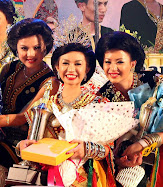





Libya's leader, Colonel Muammar Gaddafi. He rules Libya for 42 years!!!
This is a historic victory in the holy month of Ramadhan to the Libyan rebels.
Most of Tripoli's and most of Libya are now under their control in lightning advance, ending the 6 months old civil war in Libya and ending Gaddafi's 42 years iron fist rule.


Howver the whereabouts of Muammar Gaddafi, Libya's long serving ruler or rather dictator is nowhere to be seen.
Gaddafi's last ever public speech before the fall of Tripoli. He urges Libyan "to purify those rats"!!! which means "GO KILL 'EM"!!!
Gaddafi's fiery speech in February 2011, urging to find every single person who dared to fight him, has become world famous, edited and turned into a music video entitled Zenga Zenga.
The Rebels celebrated the victory in Green Square, the symbolic heart of Muammar Gaddafi's regime.
Gaddafi's defenders quickly melted away but pockets of resistance remained.
State TV broadcast Gaddafi's bitter pleas for Libyans to defend his regime.
Opposition fighters captured his son and one-time heir apparent, Seif al-Islam, who along with his father faces charges of crimes against humanity at the International Criminal Court in the Netherlands. Another son was under house arrest.
Seif al-Islam, his father and Libya's intelligence chief were indicted earlier this year for allegedly ordering, planning and participating in illegal attacks on civilians in the early days of the violent crackdown on anti-regime protesters.
Another son, Mohammed, was under house arrest. Mohammed, who is in charge of Libyan telecommunications, appeared on the Arabic satellite channel Al-Jazeera, saying his house was surrounded by armed rebels.
"They have guaranteed my safety. I have always wanted good for all Libyans and was always on the side of God," he said. Close to the end of the interview, there was the sound of heavy gunfire and Mohammed said rebels had entered his house before the phone line cut off.
"It's over, frizz-head," chanted hundreds of jubilant men and women massed in Green Square late Sunday 21st August 2011, using a mocking nickname of the curly-haired Gaddafi.
The revelers fired shots in the air, clapped and waved the rebels' tricolor flag.
Some set fire to the green flag of Gaddafi's regime and shot holes in a poster with the leader's image.
The startling rebel breakthrough, after a long deadlock in Libya's 6-month-old civil war, was the culmination of a closely coordinated plan by rebels, NATO and anti-Gadhafi residents inside Tripoli.
Rebel fighters from the west swept over 20 miles (30 kilometers) in a matter of hours Sunday 21st August 2011, taking town after town and overwhelming a major military base as residents poured out to cheer them.
At the same time, Tripoli residents secretly armed by rebels rose up.
When rebels reached the gates of Tripoli, the special battalion entrusted by Gaddafi with guarding the capital promptly surrendered.
The reason: Its commander, whose brother had been executed by Gadhafi years ago, was secretly loyal to the rebellion.
United States President Barack Obama said Libya is "slipping from the grasp of a tyrant" and urged Gaddafi to relinquish power to prevent more bloodshed.
"The future of Libya is now in the hands of the Libyan people," Obama said in a statement from Martha's Vineyard, where he's vacationing. He promised to work closely with rebels.
By the early hours of Monday 22nd August 2011, opposition fighters controlled most of the capital.
The seizure of Green Square held profound symbolic value - the plaza was the scene of pro-Gadhafi rallies organized by the regime almost every night, and Gaddafi delivered speeches to his loyalists from the historic Red Fort that overlooks the square.
Rebels and Tripoli residents set up checkpoints around the city, though pockets of pro-Gadhafi fighters remained.
In one area, AP reporters with the rebels were stopped and told to take a different route because of regime snipers nearby.
In a series of angry and defiant audio messages broadcast on state television, definat and visibly angry Gadhafi called on his supporters to march in the streets of the capital and "purify it" of "the rats." He was not shown in the messages.
His defiance raised the possibility of a last-ditch fight over the capital, home to 2 million people.
But it seemed that significant parts of Gaddafi's regime and military were abandoning him.
His prime minister, Al-Baghdadi Al-Mahmoudi, fled to a hotel in the Tunisian city of Djerba.
It was a stunning reversal for Gadhafi, who earlier this month had seemed to have a firm grip on his stronghold in the western part of Libya, despite months of NATO airstrikes on his military which continues in the holy month of Ramadhan.
Rebels had been unable to make any advances for weeks, bogged down on the main fronts with regime troops in the east and center of the country.
Gadhafi is the Arab world's longest-ruling, most erratic, most grimly fascinating leader - presiding for 42 years over this North African desert nation with vast oil reserves and just 6 million people.
For years, he was an international pariah blamed for the 1988 bombing of a Pan Am jumbo jet over Lockerbie, Scotland, that killed 270 people.
After years of denial, Gadhafi's Libya acknowledged responsibility, agreed to pay up to $10 million to relatives of each victim, and the Libyan rule declared he would dismantle his weapons of mass destruction program.
That eased him back into the international community.
But on February 22, 2011 days after the uprising against him began, Gadhafi gave a televised speech vowing to hunt down protesters "inch by inch, room by room, home by home, alleyway by alleyway."
The speech caused a furor that helped fuel the armed rebellion against him and it has been since mocked in songs and spoofs across the Arab world.
The rebels' leadership council, based in the eastern city of Benghazi, sent out mobile text messages to Tripoli residents, proclaiming, "Long live Free Libya" and urging them to protect public property.
Internet service returned to the capital for the first time in six months.
The day's first breakthrough came when hundreds of rebels fought their way into a major symbol of the Gadhafi regime - the base of the elite 32nd Brigade commanded by Gadhafi's son, Khamis. Fighters said they met little resistance. They were 16 miles from the big prize, Tripoli.
Hundreds of rebels cheered wildly and danced as they took over the compound filled with eucalyptus trees, raising their tricolor from the front gate and tearing down a large billboard of Gadhafi. From a huge warehouse, they loaded their trucks with hundreds of crates of rockets, artillery shells and large-caliber ammunition.
One group started up a tank, drove it out of the gate, crushing the median of the main highway and driving off toward Tripoli.
The rebels also freed more than 300 prisoners from a regime lockup, most of them arrested during the heavy crackdown on the uprising in towns west of Tripoli. The fighters and the prisoners - many looking weak and dazed and showing scars and bruises from beatings - embraced and wept with joy.
The uprising against Gadhafi broke out in mid-February, 2011 and anti-regime protests quickly spread. A brutal regime crackdown quickly transformed the protests into an armed rebellion.
Rebels seized Libya's east, setting up an internationally recognized transitional government there, and two pockets in the west, the port city of Misrata and the Nafusa mountain range.
Gadhafi clung to the remaining territory, and for months neither side had been able to break the other.
In early August, 2011 however, rebels launched an offensive from the Nafusa Mountains, intending to open a new, western front to break the deadlock.
They fought their way down to the Mediterranean coastal plain, backed by NATO airstrikes, and captured the strategic city of Zawiya.
Long Live Libya... Good Bye Gaddafi or Gadhafi.. Who cares

































No comments:
Post a Comment